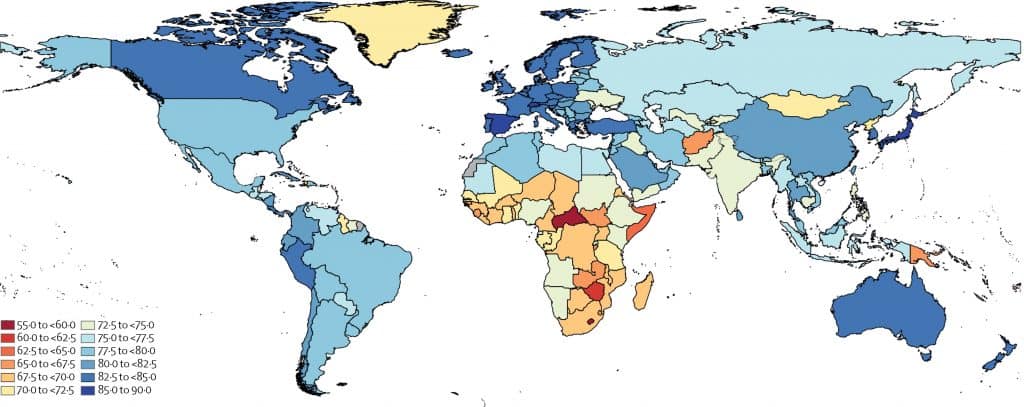A new study published in the medical journal The Lancet shows that US life expectancies will improve minimally between now and the year 2040.[1]
The average life expectancy of a citizen of the US was 78.7 years in the year 2016.
In the year 2040, the average life span is expected to be only 79.8 years, for a meager 1.1 year increase.
This improvement is especially small compared to other Western nations.
In contrast, life expectancy improvements globally will average a gain of 4.4 years in the same time frame.

The study used a forecasting model to predict the life expectancy improvements, and makes assumptions about the health risk factors that will impact lifespan in the year 2040.
For example, Body Mass Index (BMI) is expected to continue to increase globally, as it has since the year 1990.
Ischaemic heart disease, stroke, and diabetes will continue to be significant risk factors globally, but dementias such as Alzheimer’s disease will also be prominent risk factors as populations age.
Projected risk factors that will be the leading cause of “Years of Lifespan Lost” (YLL) for the US are:
- Ischaemic heart disease
- Alzheimer’s disease and other dementias
- Tracheal, bronchus, and lung cancer
- Drug use disorders
- Chronic kidney disease
- Colon and rectum cancer
- Road injuries
- Chronic obstructive pulmonary disease
- Lower respiratory infections
- Diabetes mellitus
References
1. Forecasting life expectancy, years of life lost, and all-cause and cause-specific mortality for 250 causes of death: reference and alternative scenarios for 2016–40 for 195 countries and territories. Kyle J Foreman, PhD, Neal Marquez, BA, Andrew Dolgert, PhD, Kai Fukutaki, BA, Nancy Fullman, MPH, Madeline McGaughey, BA, et al., DOI:https://doi.org/10.1016/S0140-6736(18)31694-5

Tim is the founder of FitAtMidlife.com – an avid gym rat for 30+ years, he’s a reviewer of many, many shoes – and founder of the Speed Bag Gathering – the world’s only gathering of speed bag punching enthusiasts. See more gym reviews at Tim’s YouTube channel.
